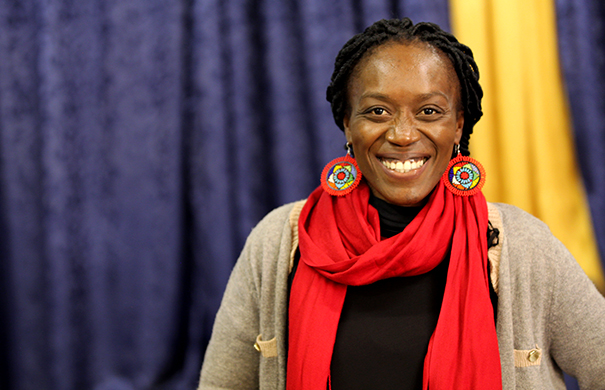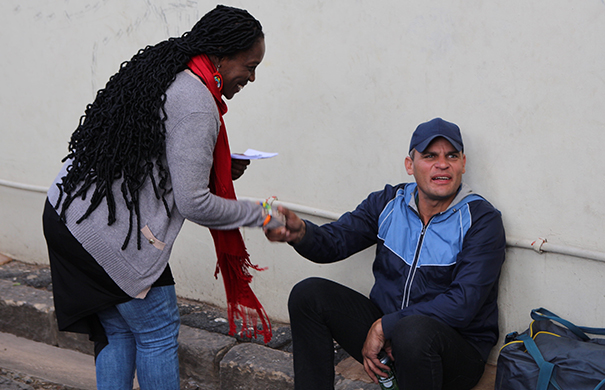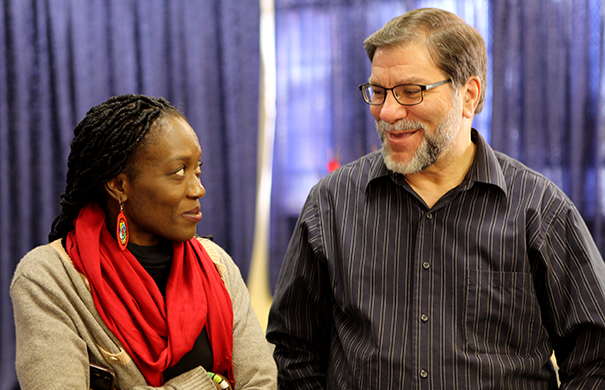
Ministry Updates
She Gave Up Her Parents — and She’s Not Sorry
February 22, 2018
by admin

When Liyana* decided to go to Bible college, she knew her ancestor-worshipping father probably wouldn’t take it well.
But she didn’t expect her Christian mother to disapprove. She certainly didn’t expect to be kicked out of the house!
In a flash, she went from living in a nice neighborhood to worrying about having bus money — or running water. All that, just because she wanted to share the Gospel with her fellow South Africans.
Raised in Two Religions
Liyana grew up between two different spiritual worlds.
Her mother came from a strong Christian background. Her father came from Zionism — a syncretic religion that fuses Christianity with traditional African animism. Eventually, he even became a nyanga, or “traditional healer.”
Unsurprisingly, Liyana’s parents divorced while she was still young. But Liyana managed to straddle the two worlds of her parents for 17 years.
And then, one day, she met Phillip.
Bible College Grad Leads Her to Christ
Phillip had attended Durban Bible College, a school where TEAM missionaries and other believers disciple aspiring church leaders.
Liyana’s moment of truth came when Phillip was preaching near her hometown.
“A light came into my life that day for the first time. I never knew I had darkness,” says Liyana, “but when he preached about the Light, suddenly I knew the difference between light and darkness.”
Liyana accepted Christ that day.
Drawn to a Life of Ministry

Liyana spent her college years ministering to the homeless, and her passion for sharing the Gospel only grew. Photo by TEAM
During her college years, Liyana became heavily involved in homeless and streetside ministry.
Shortly after graduating, Liyana resigned from her job at a logistics company to work at a local church.
Three years later, she felt it was still not enough.
“I felt that the Holy Spirit had really impressed upon me to go and study the Word,” says Liyana. “So, I went to Pastor Phillip because I knew that he had gone to a Bible college.”
Phillip advised her to attend his alma mater. That same year, Liyana enrolled — and instantly became the family disappointment.
Disowned for Going to Bible College
In Liyana’s mother’s eyes, her only daughter had wasted a university education and given up a high position in a good company for nothing.
Liyana was kicked out of her mother’s home and had to go live with Phillip and his wife.
Phillip’s neighborhood was nothing like what Liyana was used to. Her first week there, the water got shut off, and Liyana had to learn how to use a government tap system.
“That was a huge transition for me,” Liyana says.
But as Liyana started attending classes and getting to know her teachers, she realized her sacrifice had been worth it. TEAM missionaries and DBC professors Brian and Joyce Flickner were a special encouragement to her.
“I did not have that relationship with my dad,” she says. “So, one of the things that God … sort of exposed me to [through Brian] was a father.”
Joyce served as Liyana’s mentor — meeting with her every few weeks for counseling or just to talk.
Little did Liyana know, the close relationship she’d developed with Brian and Joyce would carry on long after graduation.
Reaching the Marginalized and Hopeless

TEAM missionary and DBC professor Brian Flickner helped mentor Liyana and her classmate as they planted their own church. Photo by TEAM
Liyana and her DBC classmate, Kwanele, began helping a church with their homeless ministry. But they quickly realized the pastor was preaching a false gospel.
They spoke with a member of the church and convinced him to attend DBC and learn the Word for himself.
“Then things just began from there,” says Liyana. “People would just start calling us, even from within the church, because the Word was not being preached properly.”
That’s when Liyana and Kwanele felt the Lord calling them to plant their own church in the impoverished area.
And that’s exactly what they did. But not until after they’d asked Brian and Joyce to serve as their spiritual mentors throughout the process.
A Light Now Shines in the Darkness — Thank You!
Liyana and Kwanele minister in an area riddled with drug addicts, prostitutes and murderers.
“You have to give them food, then gain their trust, then … start ministering to them,” says Liyana.
The process is slow — but the need is great.
Not only are drug-related killings rampant, but killings of an even darker nature are starting to crop up in the streets where Liyana ministers.
People are being kidnapped, killed and mutilated for witchcraft. In fact, Liyana and Kwanele have already lost one of their own church members to the mystery killers.
But for Liyana, this obvious depravity is fuel to keep preaching the Gospel and encouraging more Christians to attend Bible college.
“Here in Durban, I know there is no Bible college that still … maintains the basics of the Bible,” says Liyana. “The Gospel is really diluted and compromised, and a lot of deception is out there, even in some of the Bible colleges. DBC is still maintaining and really standing on teaching the Truth.”
*Name changed for privacy.
Related articles


